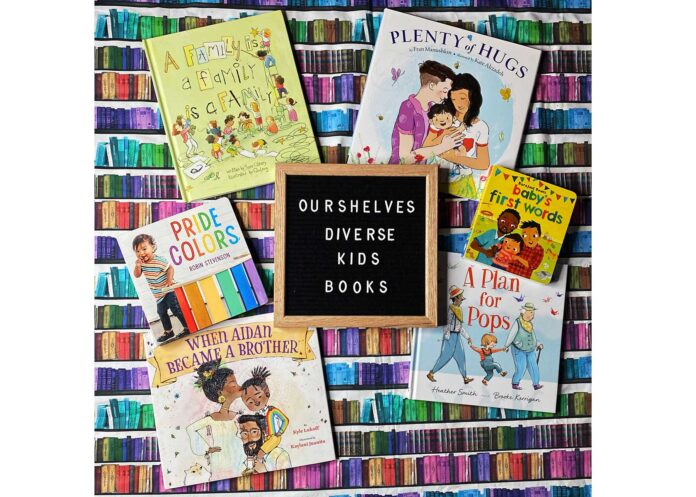When lawyer, policy advocate, and community organizer Alli Harper and her wife had their first child, they did what many LGBTQ parents do: looked for children’s books that showed two-mom and other diverse families. The difficulty of finding more than a handful, however, led Harper to launch a nationwide service that is connecting readers with these books while also pushing the publishing industry to create more.
When she and her wife failed to find the books they sought, and heard similar stories from other LGBTQ parents, “We were surprised in large part because we felt like there was a significant audience,” she told me in an interview. When their own daughter grew too old for picture books, they realized that like so many other kids, she’d “missed out on seeing herself and her family appropriately and adequately represented.”
Harper then made two observations: first, that “There just aren’t enough high-quality LGBTQ and other diverse kids’ books, period. That means we can’t even scratch the surface of the diversity within our families,” and second, that “Sometimes these books do exist — more existed than we knew of — but they can often be too hard to find.”
In 2018, therefore, she founded OurShelves, a book-subscription service with a dual mission, to “review and select high-quality, LGBTQ and other diverse kids’ books and connect them to the busy families, librarians, teachers, and others seeking them,” and “to advocate for the many more LGBTQ and other diverse kids’ books still needed.” The advocacy part was nothing new for Harper, who had been president of the Maryland ACLU during that state’s marriage equality fight in 2012, while also pregnant with her and her wife’s first child.
OurShelves accomplishes the first part of its mission through quarterly book-box subscriptions as well as one-time gift boxes. Each box is curated based on the age of the subscriber’s child(ren), with Sunshine Boxes of board books for kids ages 0 to 2, Rainbow Boxes for kids ages 2 to 5, and Treehouse Boxes for kids ages 5 to 8. Members choose whether they want one, three, or five books in each box.
“First and foremost, we’re looking for quality of text and illustration,” Harper said. “Our kids, and all kids, deserve to see high-quality LGBTQ representation.” Additionally, OurShelves wants “content that is as reflective of the diversity within our families as possible.”
Harper explained, “Ideally, there would be books that show characters and families living at the intersection of multiple underrepresented identities — LGBTQ, Black, indigenous, people of color, disabled.” That kind of intersectional representation can still be hard to find within individual books, however, but they make sure that each box of multiple books contains characters and families with “various traditionally underrepresented identities,” and includes at least one book with LGBTQ characters. They particularly look for “stories where there are LGBTQ families out and proud, but the storyline doesn’t have to be about whether we are legitimate or okay as people and families.” They also emphasize “OwnVoices” books, a term coined by author Corinne Duyvis, meaning “the author or illustrator shares the underrepresented identity of the character in the story,” Harper said.

To choose the books, Harper has brought together a curation team that is majority LGBTQ and majority people of color, with expertise in “academia, librarianship, teaching, early childhood development, parenting, and identity-based bias.”
“One hundred percent of our curation team have the lived experience of being both underrepresented themselves and having children who are underrepresented in kids’ books,” she asserted.
OurShelves pursues the advocacy part of its mission in two ways. First, they try to inform publishers about the stories its members want, based on feedback from frequent surveys. “We’re always asking, ‘What are you looking for that you can’t yet find?’” Harper explained. “We’re trying to continually come up with ways to communicate this to publishers.”
Additionally, she said, they want to go “beyond advocacy” and buy the books “in ever-growing numbers.” Sometimes, this means seeking out smaller or foreign presses. For example, when they first heard of the two-mom story, “My Mommy, My Mama, My Brother, and Me,” by Natalie Meisner, from the small Canadian press Nimbus Publishing, it was not yet being sold or distributed in the United States. OurShelves became the first to bring it here.
Her goal is “to shift publishers’ perception away from [the idea] that these books are risky to create, to that there is significant opportunity,” something different publishers understand to varying degrees, she feels. She cited a 2019 survey from Family Equality showing that up to 3.8 million LGBTQ millennials are considering becoming first-time parents or adding more children to their families. She added, “The majority of babies in this country are babies of color. Millions and millions of people want these books. Our hope is that we can make it easier for publishers to connect these books and then also make it easier to connect the voices of some of these families, teachers, and librarians back to publishers so we can be better partners in creating these books.”
OurShelves’ membership tripled in 2020 and they now have members in all 50 states — proof that it is filling a need.
“Our growth has been because of our members sharing us as a resource,” Harper said. When members join OurShelves, she said, “they’re both being connected to these wonderful curated books, and also being counted as part of this ever-growing audience, to really prove to publishers how significant the audience is for these books.”
OurShelves is now taking orders for its spring subscription boxes. Visit ourshelves.com to learn more.
Dana Rudolph is the founder and publisher of Mombian (mombian.com), a GLAAD Media Award-winning blog and resource directory, with a searchable database of 600+ LGBTQ family books, media, and more.
